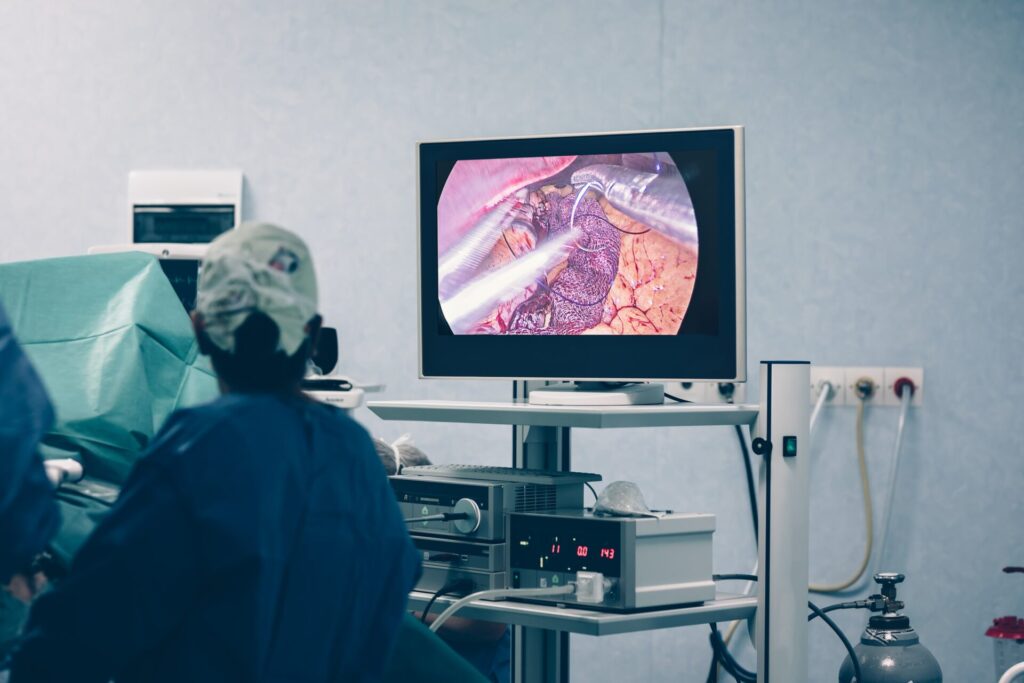Bariatric surgery is a medical procedure aimed at helping individuals lose significant weight. Despite its benefits, it carries inherent risks, with major complications occurring in about 4% of cases. Given these risks, medical professionals must strictly adhere to established standards of care during and after the surgery.
Medical malpractice occurs when healthcare providers fail to meet these standards, resulting in harm to the patient. In the context of bariatric surgery, this can involve errors during the procedure, poor post-operative care, or inadequate patient evaluation before surgery.
Recognizing potential malpractice starts with understanding medical negligence in bariatric surgery. Failure to provide the required standard of care by a bariatric surgeon or other medical professionals opens the door to medical malpractice actions. These cases hinge on proving that the healthcare provider’s negligence directly caused the patient’s injury.
If you or a loved one has faced complications or inadequate care after bariatric surgery in New York, it’s crucial to understand your legal options. The Pagan Law Firm is dedicated to guiding you through medical malpractice cases, including those related to bariatric procedures or weight loss surgery class action lawsuit. With our extensive experience and commitment to holding healthcare providers accountable, we are here to help you seek justice and compensation.
Don’t let negligence go unaddressed—contact The Pagan Law Firm today at 212-967-8202 for a comprehensive consultation and take the first step towards protecting your rights and securing the justice you deserve in New York.
👉Also Read: How Gastric Bypass Surgery Can Lead to Medical Malpractice
Common Types of Bariatric Surgery Errors

Malpractice in bariatric surgery can stem from various factors. Insufficient candidate evaluation, surgeon incompetence, and inadequate post-operative care are key contributors. For example, severe complications can arise if a bariatric surgeon does not properly assess a patient’s suitability for surgery.
Specific surgical errors, such as operating on the wrong side or improper suturing, can lead to disastrous outcomes. Gastric bypass and gastric sleeve surgeries, common types of bariatric procedures, carry specific risks including gallstones and vitamin deficiencies. Failure to address these complications promptly can signal negligence.
One of the most critical aspects of preventing malpractice is the involvement of a multidisciplinary team both before and after surgery. This approach ensures comprehensive care, reducing the likelihood of post-surgery complications such as infections and severe conditions such as Wernicke’s encephalopathy. Litigation often arises not from the complications but from the failure to promptly detect and address them.
Identifying Medical Negligence in Bariatric Surgery
Medical negligence in bariatric surgery involves a breach of the standard of care by healthcare professionals, leading to patient harm. Patients must demonstrate that their health issues resulted from inadequate care to establish a medical malpractice case.
To prove a malpractice claim, one must show that the healthcare provider owed a duty of care, breached it, and caused harm, resulting in damages. Expert testimony often establishes what the standard of care should have been and how it was violated.
Internal bleeding, leakage, and infections are common complications from bariatric surgery that may indicate negligence. Improper patient selection, like failing to evaluate a patient’s overall health and suitability for surgery, can also lead to errors. Post-operative complications such as bowel obstruction and hernias often require further medical intervention, underscoring the importance of proper monitoring.
Causation in malpractice claims is categorized into two types: cause in fact and proximate cause. Cause in fact determines if the harm would have occurred without the defendant’s action, while proximate cause assesses if the harm was a foreseeable consequence of the defendant’s conduct.
The doctrine of res ipsa loquitur sometimes allows plaintiffs to use circumstantial evidence to establish negligence when direct proof is unavailable.
Legal Steps to Take After Suspected Bariatric Surgery Malpractice
If you suspect malpractice after bariatric surgery, start by documenting any symptoms or complications you experience. Detailed records of your health issues can strengthen your case. Getting a second opinion from another qualified healthcare provider is also crucial, as it clarifies your condition and whether malpractice occurred.
It’s important to contact a medical malpractice lawyer early on. A lawyer can navigate the complexities of your case, ensuring critical timelines are met and common pitfalls are avoided. Avoid communicating with insurance companies without consulting your medical malpractice attorney, as this can jeopardize your case.
Promptly taking these steps can significantly impact the outcome of your New York medical malpractice case. A qualified New York medical malpractice lawyer will guide you through the legal process, helping you build a strong case.
Proving a Bariatric Surgery Malpractice Case
Proving a medical malpractice case requires establishing that the healthcare provider breached their duty of care in medical malpractice cases. This requires showing that the medical professional’s actions fell below the accepted standard of care, directly causing the patient’s injuries.
Expert testimony is often crucial in these cases, helping establish the standard of care and illustrating how negligence led to the injuries. Plaintiffs must demonstrate that the breach of duty directly caused the harm, often requiring detailed medical evidence and professional insights.
Victims of bariatric surgery malpractice can claim damages for medical expenses, lost wages due to inability to work, and pain and suffering. These claims cover the costs associated with the injury and provide some measure of justice for the victims.
Compensation for Bariatric Surgery Malpractice Victims
Victims of bariatric surgery malpractice are entitled to various types of compensation. This includes financial support for medical expenses, lost wages, and loss of companionship. These compensations address the economic and emotional toll of medical negligence.
Legal representation is key in negotiating settlements to ensure fair compensation. A skilled medical malpractice lawyer will advocate on your behalf, striving for the best possible outcome. Confidential settlements often provide victims with financial relief while maintaining privacy.
Navigating the complexities of a medical malpractice case requires both skill and dedication. Securing a knowledgeable medical malpractice attorney allows victims to focus on their recovery while their legal team handles the intricacies of their claims.
👉Also Read: When You Need a Medical Malpractice Attorney
The Role of a New York Medical Malpractice Lawyer in Bariatric Cases
A medical malpractice lawyer plays a vital role in bariatric surgery malpractice cases. Medical malpractice attorneys familiar with these procedures can identify issues arising from surgical errors and provide informed legal guidance. Being well-versed in the complexities of bariatric surgery, they can navigate the medical intricacies involved.
Medical malpractice lawyers help gather medical records and evidence to support a malpractice claim. This involves obtaining expert testimony to explain the applicable standard of care and whether the defendant breached it. This guidance is essential for building a strong case.
Working with a New York medical malpractice lawyer ensures that the case is handled professionally and effectively within the medical profession by a medical professional. This legal support is essential for pursuing justice and obtaining fair compensation from medical malpractice lawyers.
Time Limits for Filing Bariatric Surgery Malpractice Claims in New York
In New York, there are specific time limits, known as statutes of limitations, for filing malpractice claims, including those related to bariatric surgery. Generally, you have two and a half years from the date of the alleged malpractice to file a lawsuit. This means you must initiate legal action within 30 months from when you first discovered, or reasonably should have discovered, the injury caused by the malpractice.
However, there are exceptions to this rule. For example, if the malpractice was not immediately apparent, the time limit might be extended. Additionally, if the malpractice involved a public hospital, the rules can be more complex, often requiring a notice of claim to be filed within 90 days of the incident.
It’s crucial to consult with a qualified attorney as soon as possible to ensure you meet all deadlines and understand the specific details of your case.
Contacting a Lawyer for Bariatric Surgery Malpractice
If you suspect that you are a victim of bariatric surgery malpractice, act swiftly. Request your medical records and contact a lawyer immediately. An experienced medical malpractice lawyer will help you understand your legal options, gather evidence, and navigate your case’s complexities.
Seeking legal advice promptly ensures your rights are protected and increases your chances of securing the compensation you deserve. A medical malpractice attorney will guide you through every step of the process, providing the support needed during this challenging time.
👉Also Read: Top Surgical Malpractice Attorneys: Advocacy for Victims of Medical Negligence
Take Action Now: Contact The Pagan Law Firm for Your Bariatric Surgery Malpractice Case
Have you or a loved one experienced complications from bariatric surgery in New York? It’s crucial to take action and explore your legal options if you believe medical negligence is involved. At The Pagan Law Firm, we understand the significant impact of medical malpractice and are committed to holding negligent healthcare professionals accountable.
Our dedicated team will work tirelessly to gather evidence, navigate the complexities of your case, and fight for the compensation you deserve. Don’t let subpar care go unchallenged—reach out to us today for a free consultation. Let us help you take the first step towards justice and ensure your rights are protected.

